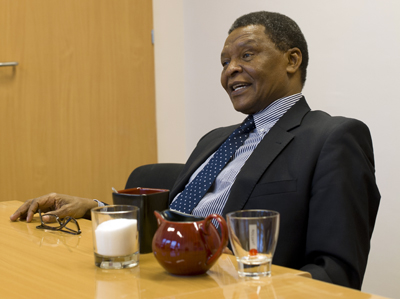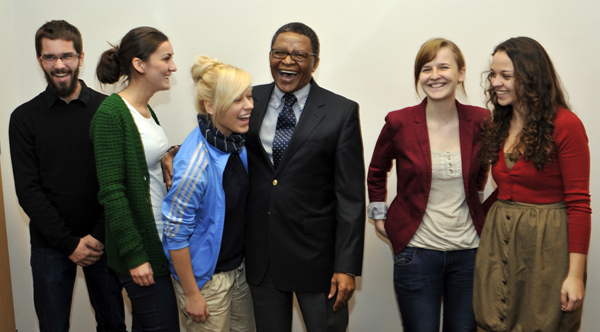|
|
|||||
|
|
An interview with the South African Ambassador:His Excellency, Dr Ted Pekane We are soon visiting South Africa. From a cultural, historical and political perspective, if we only have two weeks to see the country, where should we visit? If you had only two weeks? It’s too little. There are so many places to visit while in South Africa and two weeks is definitely too little to explore the treasure trove of beautiful sights and sites of cultural and historical importance. I would recommend the Kruger National Park – an area of more than 19, 000 square kilometres. If you want to see sights that are interesting from a political perspective, there are quite a number of places in South Africa. I’d recommend Soweto, a city of cultural interaction and in the past the centre of political campaigns aimed at overthrowing the apartheid state. It was in this cluster of townships on the south-western flank of Johannesburg where the 1976 uprising, known as the Soweto Student Uprising, gathered thousands of students and thereafter spread to the rest of the country. Here one can also visit Nelson Mandela’s first house, where he stayed before he was imprisoned in 1961. Another interesting site would be Freedom Square in Kliptown, where the African National Congress came together to adopt what we call the Freedom Charter. Also, the capital of the Free State – Bloemfontein. Where is your favourite place in South Africa? I had an opportunity to be Mr Mandela’s Chief of Protocol and back then we used to travel through South Africa a lot. One spot which I consider quite impressive is the Cape coast, especially the place where one can witness the Atlantic Ocean, on the west coast, cooled by the icy Benguela Current, and the Indian Ocean, on the east, warmed by the Agulhas Current, splashing together. What influenced your decision to leave South Africa and go into exile? Tell us how you left South Africa and where you went to. Can you tell us more about the day you landed back in South Africa after your many years in exile and how you felt when your family and friends saw you for the first time? Well, I left South Africa in 1964. I left Johannesburg by train. As a member of the underground movement in Johannesburg, I could count on people who organized this action. I soon reached the border of Botswana and from there crossed into Zambia via Livingstone. Then I crossed the border into Tanzania and from there we travelled overseas. My first overseas travel was in 1965 when I flew to Odessa. Odessa is where most of our people went to, or were taken to. I stayed there for six months and from there I travelled to Tashkent in Uzbekistan and also stayed there for another 6 months. We intended to come back to Tanzania. I went to Bulgaria in 1972, when I was a student. I studied at Sofia University in Bulgaria where I obtained my Ph.D degree in International Public Law. I left Bulgaria in 1981. I returned to South Africa when the negotiations were taking place, but before I went to South Africa, I was the Chief Representative of the ANC in Brussels from 1989 until 1991. How do you see the relationship between South Africa and Poland? Are there similarities between the two countries? I think that the relationship between South Africa and Poland is good – South Africa has identified Poland as a strategic partner in this region. These are two distinct countries, however, there are several similarities in our historical experience and national spirit. One can compare the democratic transition in Poland which started in 1989 and resulted in the rise to power of the first democratically elected government in Central and Eastern Europe, and the 1994 transition to democracy in South Africa – the South African general election which marks the end of apartheid. Both countries were occupied at some point in the past and both managed to establish a democratic philosophy of humanitarianism and tolerance. Also, these two countries can be justifiably proud of their history of struggle for the fundamental values of freedom, democracy and human rights. What would your message to the youth of South Africa be? Would that message be different to the youth of Poland? The young people of South Africa and Poland should appreciate what other people have done for them, that they struggled for freedom, peace, justice and equality in these countries. The youth has the power and energy to create new wealth and build new connections to the world, to change the world and bring harmony to it.
|
Uniwersytet im. Adama
Mickiewicza w Poznaniu Wydział Anglistyki       Niderlandy RPA w UAM Dutch & South African Studies Poznań |
|||

